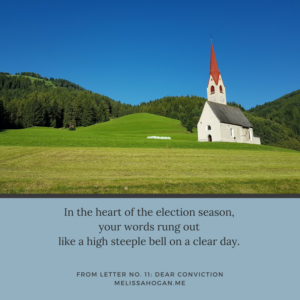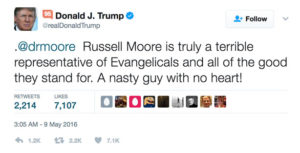Dear Dr. Russell Moore,
I’m someone who self-identifies as an “evangelical.”
An “evangelical Christian.” At the same time, I’ve also always self-identified as a “conservative Republican.” The overlap of the two was almost indistinguishable in many ways to me.
It’s not that I thought my Christian friends who were Democrats were wrong (well, let’s be honest here, I probably did), I just thought I saw more rightness in being a Christian Republican.
Issues like abortion. Religious freedom. God-ordained marriage. Support for Israel. Work ethic. Personal responsibility. Lower taxes. Less burdensome and overreaching government. Balanced budgets. Right to bear arms. Enforcing laws. Supporting troops and veterans. So many Republican platform issues that I could get behind and did for many years.
One Part Christianity. One Part Politics. One Part Hypocrisy.
While some of these issues reflect principles directly from the Bible and my Christian faith, I’m not sure when or why I started equating almost all of them with Christianity. Was it me? Or was I strategically manipulated into that association? I can only ask that question with the clarity of hindsight (readers, check out: Amazing Disgrace).
And where did I find issues like caring for the poor, racial justice, refugees, etc. in my political convictions? Or better, why did I think those issues were best handled personally or delegated to private action but the earlier ones were somehow most important to be addressed by political solutions?
And that’s where you come in. Even though I’ve never been a Southern Baptist per se (I’ve always attended an independent Bible-believing church as a youth and then also as an adult), I am what polsters would call a white evangelical Christian, a constituency of great interest in the past year. And even more so, those who know me would likely have described me as a very conservative, long-time Republican.
I have read your mission, as the President of the Ethics & Religious Liberty Commission of the Southern Baptist Convention, to “assist the churches by helping them understand the moral demands of the gospel, apply Christian principles to moral and social problems and questions of public policy, and to promote religious liberty.”
If the disagreements from the 2016 election season are any indication, I would say it is a challenging task to identify the moral demands of the gospel when it comes down to specific, tangible decisions like voting. Your job is no picnic.
I grew up with the Moral Majority.
If you had asked me many years ago, when I volunteered with Republican politics, spent time working the phones for Republican candidates in Tennessee, and attended the inauguration in 2001, I would have said that the moral demands of the gospel compel us to political participation. And that the gospel allows for and in some cases shows examples of political solutions to many of the social problems, even those mentioned in the Bible like caring for the poor, the orphan, the widow, championing life, supporting families, and encouraging financial responsibility.
But you challenged those assumptions when you wrote:
Political power — or the illusion of it — has not always been good for us. Such influence has led us to conform our minds to that of the world about what matters, and who matters, in the long-run of history. We should, as missionary Jim Elliot put it a generation ago, own our “strangerhood.”
 In the heart of the election season, your words rung out like a high steeple bell on a clear day.
In the heart of the election season, your words rung out like a high steeple bell on a clear day.
Never before as clearly, I saw us striving for earthly solutions to problems we had painted with the veneer of God’s priorities. Secure borders. Lower taxes. Patriotism and apple pie. The first-order exceptionalism mentioned by Dr. Rubel Shelly, that cloaks patriotism and nationalism with God’s design, was evident not only all around me, but in my heart as well.
But your words during the election highlighted the various threads I had woven together. They began a tear in my fabric, splitting the threads of Christianity, Republicanism, and conservatism that I once saw as inextricably intertwined.
You pulled the threads apart.
Your words kept teasing these threads apart, allowing me to see them in completely different colors. And only one thread, the thread of my faith, remained consistently straight and true, painted with the purity of Jesus. These other two threads, Republicanism and conservatism, could be dyed and kinked and cut, depending on who sought to weave them into my fabric.
In some eras, they might indeed weave a beautiful covering for my earthly perspectives, seemlessly lying in parallel beside the threads of my faith. But just because they could and just because they did in the past, did not mean they would always do so. Nor did it mean I could assume that they should do so.
As you so aptly said in the recent Erasmus Lecture:
I was left with the increasingly cynical feeling — an existential threat to my entire sense of myself and the world—that Christianity was just a means to an end. My faith was being used as a way to shore up Southern honor culture, mobilize voters for political allies, and market products to a gullible audience. I was ready to escape—and I did. But I didn’t flee the way so many have, through the back door of the Church into secularism. I found a wardrobe in a spare room that delivered me from the Bible Belt back to where I started, to the Lion of the tribe of Judah.
There is freedom in being released from a political identity.
I’m not sure why I ever thought I needed one.
My identity is and always should be as a Christ-follower, seeking to share the truths of the gospel, demonstrate the love of Jesus, and care about the things within the heart of God.
And funny enough, now that I’ve finally shed the label of Republican, I’ve been receiving all kinds of new labels – progressive, liberal, heretic – from those who are uncomfortable with political homelessness. But if that is an aspect of embracing my earthly “strangerhood” – then it is welcomed.
And if there are themes I gleaned from your words in these challenging times, they are this:
We should never sacrifice our testimony to further our politics.
We must sacrifice our politics, or whatever earthly endeavors that tempt us at any given time, to further our testimony.
And we must live out our testimony in uncomfortable places.
While I recognize that there were other leaders in the collective church who stood with you in these uncomfortable places, it was your exhortation that was often publicly ridiculed, even by the President himself.
But there were many of us who listened. And who were directed to Biblical truth time and time again. And so I thank you.
While some sought influence, you sought integrity.
While some curried favor, you cultivated faithfulness.
While some were making excuses for men, you were making disciples for Jesus.
Thank you for marking the narrow path.
In Christ alone,

Be sure to subscribe so you won’t miss any of the 52 Letters. One just might be to you.
Readers, in case you missed these relevant articles:
Why Russell Moore Matters
Amazing Disgrace
Myths Debunked: Why Did White Evangelical Christians Vote for Trump?
Southern Baptist Pastors Consider Defunding Russell Moore Due to Anti-Trump Stance
Statement on Seeking Unity Within the Southern Baptist Convention
The Letter Russell Moore Will Send Trump About the Refugee Order
President Trump: Now What For the Church?

4 responses to “Letter No. 11: Dear Conviction”
So good. This past year’s political season changed me, disappointed me and opened my eyes.
This is lovely. I feel so many of us have experienced these same revelations.
Wow! What a great letter. Not what I expected. Few are writing Dr. Moore letters of gratitude. Thank you for sharing this. I agree, his job is no picnic. I am grateful for his voice of truth and his willingness to stand on the gospel, even when it disagrees with the SBC, Republican party or others. The Gospel is the only thing we should be standing on. Everything else, flows from that.
Thank you for reading Amy! You are so correct about the gospel being our directive.